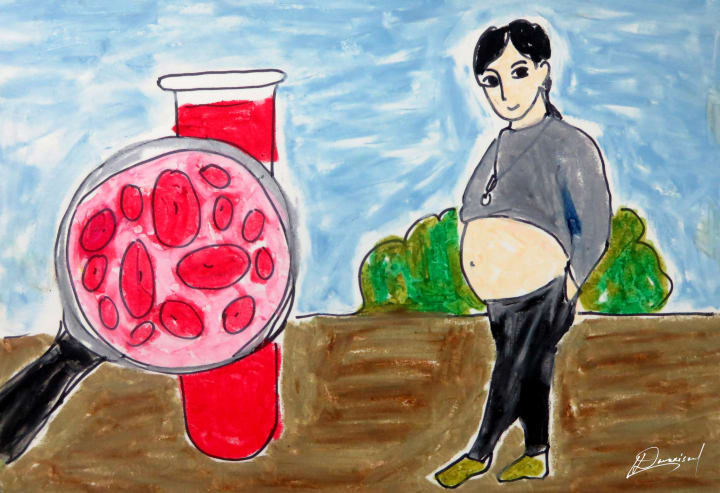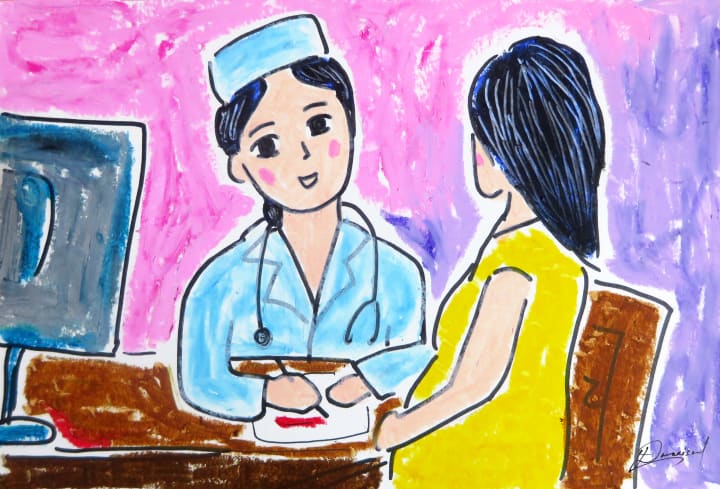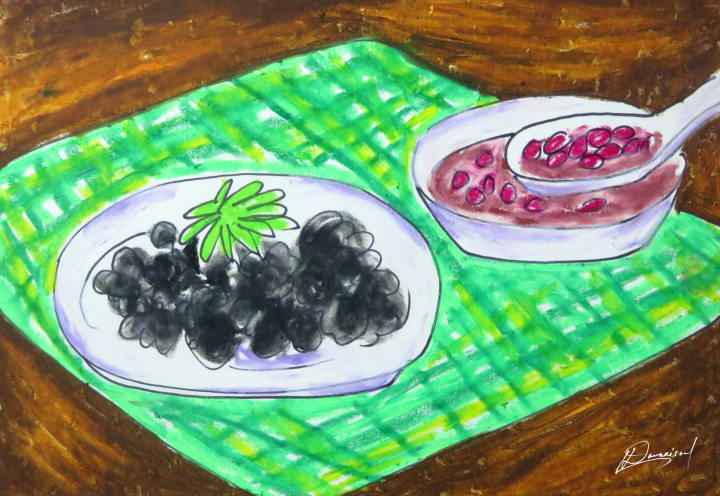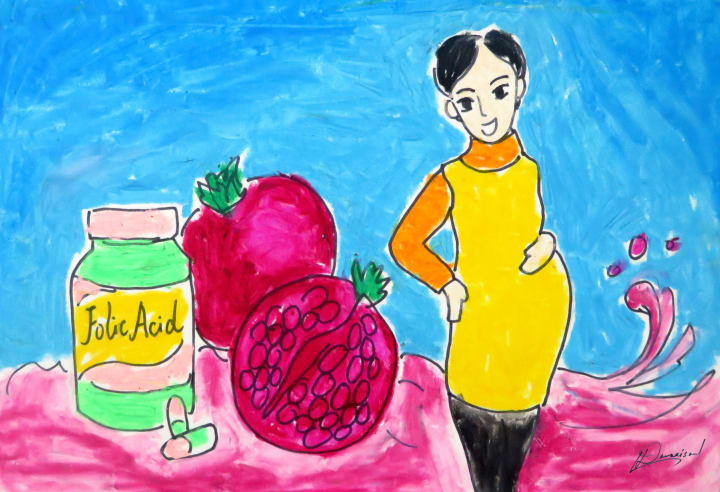Recovery of anemia in pregnancy
A summary of Doris' experience in recovering from anemia during pregnancy

It's Sunday and a good friend of the "mom-to-be" called to inquire about our daughter, little Dawnxi, and to ask about Doris' anemia during her pregnancy and her recovery afterward. We have summarized this aspect of Doris' pregnancy with little Dawnxi in the hope that it will help our pregnant friend. When Doris was about 16 weeks pregnant, she felt dizzy and her legs were very tired one day when she was getting ready to stand up after taking a shower. Daniel helped Doris up and laid down on the couch for a long time. At first, we thought it was a normal pregnancy symptom, so we didn't care. Then, Doris got up several days in a row and got dizzy in the morning and was not feeling well. A week later, we went for a prenatal checkup. After we told the doctor about the situation, the doctor said that Doris should be anemic, so Doris had a routine blood test.

When the test results came back, the doctor said that Doris was anemic due to iron deficiency. Generally, it is normal for a pregnant woman to have a hemoglobin of 100 g/L or more, while Doris' hemoglobin was below 100 g/L, which is mild anemia. Doctors say that anemia in pregnant women is often iron deficiency anemia, which is caused by the physiological changes during pregnancy, which increase the demand for iron, and the intake of iron in the diet cannot meet the body's demand, resulting in iron deficiency anemia. Generally, mild anemia does not affect the fetus much, but it needs to pay attention to the later development, therefore, dietary supplements alone are not enough, and oral iron and other medications are needed to accompany the treatment. In fact, we were well prepared for Doris' pregnancy, but we really did not have any idea about anemia during pregnancy before, nor did we particularly want to take iron supplements. After this, we treated Doris's pregnancy anemia for 3 months with a combination of food therapy and medication as recommended by her doctor.

Iron deficiency anemia in Doris is the most common condition during pregnancy. After pregnancy, Doris' body's need for iron increased significantly, and the amount of blood in her body increased. In addition, Doris needs some iron to meet the needs of her developing baby. After the second month of pregnancy, Doris becomes anemic because she does not have enough iron in her body. Our fetus will preferentially absorb the portion of iron needed by the fetus, and then Doris will absorb the iron. If Doris continues to be anemic, she may have a premature birth or low birth weight. Severe iron deficiency also affects the iron stores in the baby's body at birth, which increases the risk of the baby developing anemia during infancy. During Doris' treatment, we learned more about anemia during pregnancy and iron supplementation for pregnant women by consulting with doctors and attending some pregnancy health talks.

For anemia in pregnant women, it is necessary to further identify the cause and treat it symptomatically. If it is caused by iron deficiency anemia, it needs to be treated with iron supplementation. If it is caused by other causes, it needs to be treated according to the cause. Clinically, some pregnant women have severe anemia, which will have some effect on the fetus. Severe anemia may lead to intrauterine distress of the fetus or, in more severe cases, to stillbirth. If a pregnant woman is severely anemic, the risk of delivery will be greater. This is mainly due to the weakness of the uterus during labor, which leads to fetal distress and even fetal death. In addition, hemorrhagic shock may occur, leading to coma in pregnant women. Therefore, if a pregnant woman has severe anemia, she must actively correct it before delivery. Blood should also be prepared during labor. In case of heavy bleeding, red blood cells should be actively transfused to support treatment during labor.

After anemia in pregnant women, there will be symptoms of ischemia and hypoxia in all systems of the whole body. Cardiovascular ischemia and hypoxia will show palpitation, palpitation, and precordial pain. Respiratory ischemia and hypoxia will show dyspnea, fatigue, and decreased activity tolerance after activity. Cerebral vascular system ischemia and hypoxia will show headache and dizziness. Severe patients can also induce cerebral infarction, resulting in symptoms such as weak limb strength and unclear speech. Digestive system ischemia and hypoxia will show nausea, poor appetite, abdominal distention, and weight loss. A pregnant woman should eat more foods rich in iron in her daily diet and increase her intake of iron. Black fungus and red beans are rich in iron. Pregnant woman often eats them, which can not only prevent iron deficiency anemia but also nourish and strengthen. A pregnant woman should have a certain amount of melons and fruits every day, such as apple, red jujube, pomegranate, longan, Hami melon, and so on.
Although the melon itself is not high in iron, it is rich in vitamin C, which can promote the absorption of iron in food. It can also take pomegranate blood syrup with a blood tonic effect, etc. Pomegranate is the same source of medicine and food, with beauty, anti-aging, heart protection, softening blood vessels, and blood tonic effect. Pomegranate polyphenols also have a strong antioxidant function, which can improve a woman's complexion, slow down the aging process and improve her beauty. Pomegranate Blood Tonic Syrup, a compound preparation containing pomegranate, also has corresponding effects. Pomegranate tonic syrup is a medicine composed of pomegranate and sour pomegranate. It can effectively improve the symptoms of anemia by restoring the balance of body fluids and promoting the absorption of iron in food. A pregnant woman should have a regular daily routine, not stay up late, combine work and rest, not engage in heavy physical labor, and stay away from places with ionizing radiation.

After the second and third trimesters of pregnancy, because of the need for fetal growth and development, the fetus needs to absorb more iron from the pregnant mother. In the third trimester of pregnancy, the blood volume increases, the blood is diluted, and the iron content decreases, which is prone to "physiological anemia" during pregnancy. During pregnancy, a pregnant woman has decreased resistance, irritability, and fatigue, is prone to various infections, has poor tolerance to delivery and surgery, increase risk of pregnancy-induced hypertension, is prone to postpartum hemorrhage, has poor tolerance to blood loss, and increase risk of premature rupture of membranes, puerperal infection and postpartum depression. To prevent anemia, the body needs to have enough red blood cells and avoid the loss of red blood cells. The formation of red blood cells requires some important substances, including amino acids, fats, carbohydrates, iron and growth factors, folic acid, and vitamin B12. Although folic acid is not the main force of hematopoiesis like iron, it participates in the formation of red blood cells and is regarded as auxiliary hematopoiesis.

Pregnant women should take 0.4-0.8mg of folic acid orally every day from the first three months of pregnancy to prevent anemia at least until the first three months of pregnancy. In the later stage of pregnancy, the baby develops very fast. In order to ensure the baby's development, pregnant women should eat more foods rich in high protein, such as milk, fish, eggs, beans, lean meat, etc. For pregnant women with moderate or severe iron deficiency anemia, if the effect of oral iron supplement is poor, it also needs to be supplemented by intravenous injection for easy absorption. Fruits and vegetables can not only supplement iron but also promote the absorption of iron in the intestine. Therefore, while eating iron-rich food, it is best to eat more fruits and vegetables together, which also has a good rehabilitation effect.
When Doris was about 29 weeks pregnant, the examination results showed that hemoglobin (Hgb) recovered to 108G/L.
Original by dawnxisoul393
About the Creator
Dawnxisoul393
Couple from HK. Dr. Daniel K Lam has got his degrees in Anglia Ruskin University, Cambridge(ARU has its origins in the Cambridge School of Art, which was opened in 1858 by John Ruskin), Doris H Lam has graduated from GFAA with MFA degree.






Comments
There are no comments for this story
Be the first to respond and start the conversation.